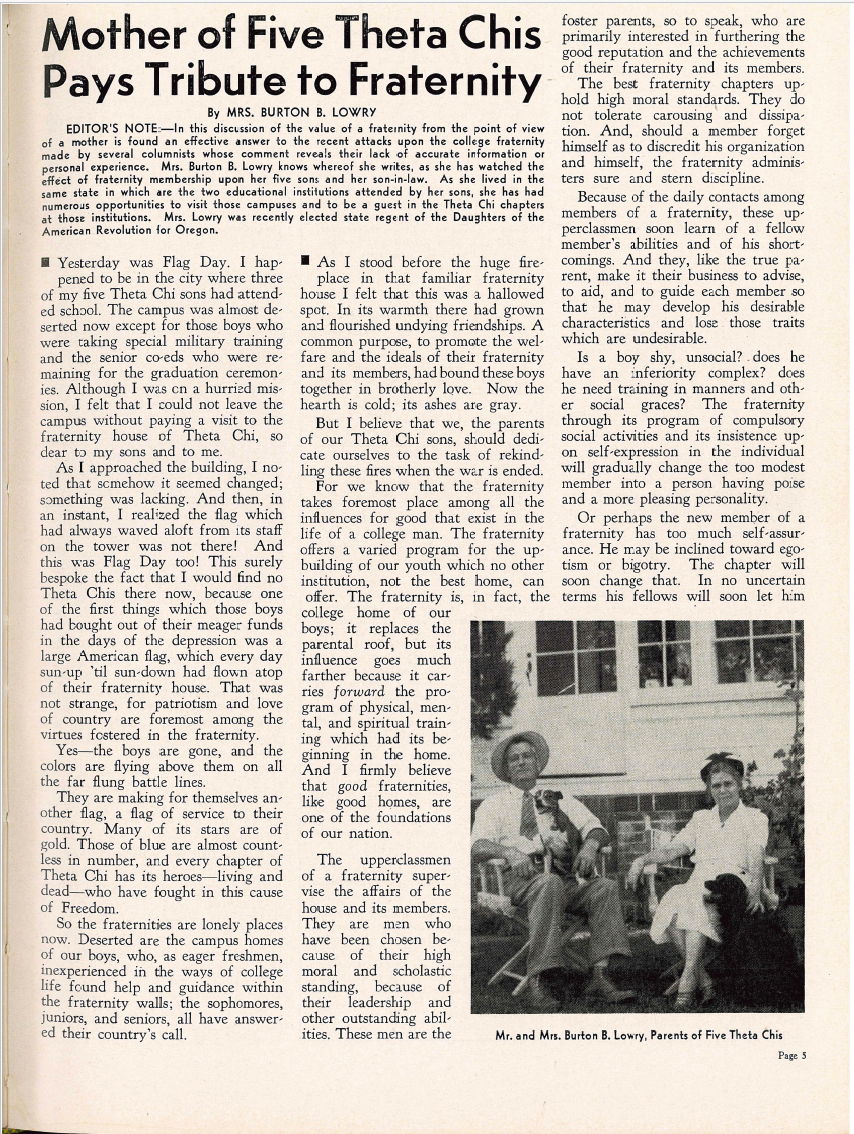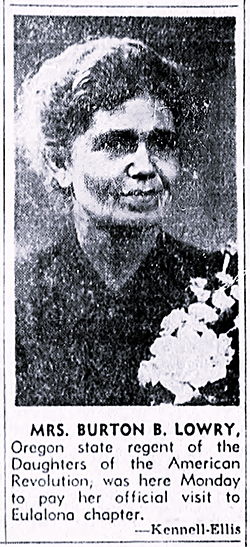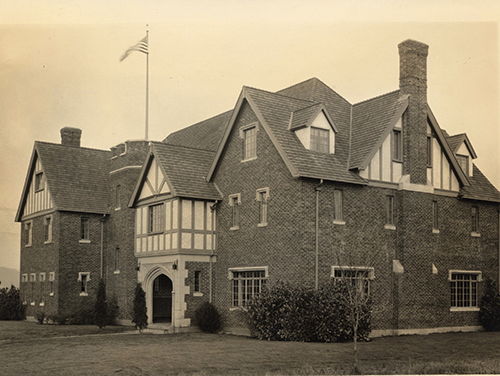From the Archives - Flag Day 1944:
Mother of Five Theta Chis Pays Tribute to Fraternity
2024 EDITOR'S NOTE: This article, written by Mrs. Burton B. Lowry, was originally published in the Fall 1944 issue of The Rattle. Mrs. Lowry visited Oregon State and noted the flag was no longer flying over the Theta Chi house - because those colors were now flying above the brothers on all the far flung battle lines of World War II. As she reflects on how Theta Chi helped her five sons grow into Resolute Men, she discusses the value of a fraternity from the point of view of a mother.

Yesterday was Flag Day. I happened to be in the city where three of my five Theta Chi sons had attended school. The campus was almost deserted now except for those boys who were taking special military training and the senior co-eds who were remaining for the graduation ceremonies. Although I was on a hurried mission, I felt that I could not leave the campus without paying a visit to the fraternity house of Theta Chi, so dear to my sons and to me.
As I approached the building, I noticed that somehow it seemed changed; something was lacking. And then, in an instant, I realized the flag which had always waved aloft from its staff on the tower was not there! And this was Flag Day too! This surely bespoke the fact that I would find no Theta Chis there now, because one of the first things which those boys had bought out of their meager funds in the days of the depression was a large American flag, which every day sun-up ‘til sun-down had flown atop of their fraternity house. That was not strange, for patriotism and love country are foremost among the virtues fostered in the fraternity.
Yes – the boys are gone, and the colors are flying above them on all the far-flung battle lines.
They are making for themselves another flag, a flag of service to their country. Many of its stars are of gold. Those of blue are almost countless in number, and every chapter of Theta Chi has its heroes – living and dead – who have fought in this cause of Freedom.
So, the fraternities are lonely places now. Deserted are the campus homes of our boys, who, as eager freshmen, inexperienced in the ways of college life found help and guidance within the fraternity walls; the sophomores, juniors, and seniors, all have answered their country’s call.
As I stood before the huge fireplace in that familiar fraternity house, I felt that this was a hallowed spot. In its warmth there had grown and flourished undying friendships. A common purpose, to promote the welfare and the ideals of their fraternity and its members, had bound these boys together in brotherly love. Now the hearth is cold; its ashes are gray.

But I believe that we, the parents of our Theta Chi sons, should dedicate ourselves to the task of rekindling these fires when the war is ended.
For we know that the fraternity takes foremost place among all influences for good that exist in the life of a college man. The fraternity offers a varied program for the upbuilding of our youth which no other institution, not the best home, can offer. The fraternity is, in fact, the college home of our boys; it replaces the parental roof, but its influence goes much farther because it carries forward the program of physical, mental, and spiritual training which had its beginning in the Home. And I firmly believe that good fraternities like good homes, are one of the foundations of our nation.
The upperclassmen of a fraternity supervise the affairs of its house and its members. They are men who have been chosen because of their high moral and scholastic standing, because of their leadership and other outstanding abilities. These men are the foster parents, so to speak, who are primarily interested in furthering the good reputation and the achievements of their fraternity and its members.
The best fraternity chapters uphold high moral standards. They do not tolerate carousing and dissipation. And should a member forget himself as to discredit his organization and himself, the fraternity administers sure and stern discipline.
Because of the daily contacts among members of a fraternity, these upperclassmen soon learn of a fellow member’s abilities and of his shortcomings. And they, like the true parent, make it their business to advise, to aid, and to guide each member so that he may develop his most desirable characteristics and lose those traits which are undesirable.
Is he a boy, shy, unsocial? Does he have an inferiority complex? Does he need training in manners and other social graces? The fraternity through its program of compulsory social activities and its insistence upon self-expression in the individual will gradually change the too modest member into a person having poise and a more pleasing personality.
Or perhaps the new member of a fraternity has too much self-assurance. He may be inclined toward egotism and bigotry. The chapter will soon change that. In no uncertain terms his fellows will soon let him know that these traits are undesirable. These fraternity brothers will help him to see himself as others see him.
The Fraternity is the greatest of all factors in teaching its members tolerance and the ability to get along one with one’s fellow men. If the fraternity did nothing else for our American youth, this one thing would justify its existence.
Is the fraternity pledge an idler? Is he lazy? Does he need assistance in reviewing his work – in planning his course of study? The fraternity has its scholastic adviser, a student who sees these problems from the student’s point of view, who will assist and insist upon a definite plan of supervised study for all underclassmen. No nights off, no dates, or other social activities are allowed those men who are behind in their scholastics. The scholastic advisers of a fraternity consult often with the teachers of these men and make every effort to keep the work of the underclassmen up to standards.
Scholastic leadership on the campus is a matter of great pride among good fraternities. And the fraternity man soon learns that his efforts must aid in building up, not tearing down, this high standard. The same is true of athletics, of all extracurricular activities.
The fraternity encourages its members to participate in all fields of endeavor. Its representatives are leaders in all campus activities. And obviously, these leaders must be, and are, chosen from the best which the campus affords. And there is no greater proof of a man’s worthiness or of his ability than to be known as a leader in a good fraternity chapter.
In leadership and other activities, the fraternities vie with one another. It is the spirit of competition which gives to fraternity members some of the most valuable training in their college career. It is a training which fits them for their places in world affairs, for their positions in a realistic world, a world of competition wherein they must work and compete for their very existence.

The spirit of loyalty and helpfulness toward one’s fraternity brothers exists in every group but it extends far beyond the walls of a chapter house. This was well demonstrated not so very long ago. A Theta Chi traveling in a state distant from his own became gravely ill. In fact, he was unconscious when found by the conductor of the train upon which he was traveling. The train crew noticed that the young man wore a Theta Chi pin upon his coat, and they immediately got in touch with members of this fraternity in a nearby city. These Theta Chi members, strangers though they were to the sick man, placed him under the care of the best doctors available. This saved his life because his illness called for special and expensive hospitalization and the most skilled medical care. These were essential to his recovery. The responsibility for all this was assumed without question or hesitation from these loyal Theta Chis.
How often in these days of sorrow and trouble the members of a fraternity have given aid, cheery encouragement, and solace to follow members who are ill or to bereaved parents whose boys have given their lives in service of their country.
The grief-stricken parents of a Theta Chi son who lost his life in the crash of a bomber have said that the beautiful ritual and the talks which the fraternity brothers made at the funeral of their son had given them much comfort. Because of the close associations which these college men had had with their son, they seemed especially near and dear to these parents. And the letters and the visits of these boys have in a large measure filled the great emptiness in the lives of these parents who are proud to say that their son was a Theta Chi.
When this war is over, when the last taps have sounded in this struggle to build a new and better world for all humanity, when we are planning a program of betterment for youth, let us seek, first of all, to reestablish the fraternity! We, the parents, know what is has done for our boys. We know what it will do for all young men who are so fortunate as to be enrolled under its guidance. I hope that my grandsons may enjoy the privileges, the opportunities, and the benefits which a good fraternity affords.
Being the mother of five Theta Chi sons and the mother-in-law of another Theta Chi, I take pride in them, and their fraternity.
So, I am standing by – ready, that I may be among the first to aid in rekindling the fires on the hearthstones of Theta Chi.
Burton B. Lowry, Jr. (Sigma/Oregon State 1930) was the first of the Lowrys to pledge Theta Chi; now supervisor in the Albina Stream and Engine Works, Portland, Ore., manufacturers of submarine chasers and LCI boats.
David B. Lowry (Alpha Sigma/Oregon 1937) established the Lowry name at the University of Oregon. He became permanent secretary of his class upon graduation, now proprietor of orchard properties and a cattle ranch in southern Oregon. He is a director of the Southern Oregon Sales Co., Inc., Medford, Ore.
Major Robert Wayne Lowry (Sigma/Oregon State 1938) was until recently, an executive officer at the Twin Cities Ordinance Plant, Minneapolis, Minn. But is now inspector of ordinance with his office in the Pentagon Building, Washington, D.C.
Dr. Wallace D. Lowry (Sigma/Oregon State 1939) did graduate work at the University of Rochester, was voted by Sigma because of his all-round good fellowship, fairness., and likeable personality “the one who contributed most in 1938-1938.” He is now state geologist with the Department of Mines and Geology, Portland, Ore.
Cpl. Phillip B. Lowry (Alpha Sigma/Oregon 1940) senior class president and president of Alpha Sigma Chapter, designated as “a fraternity brother in the most thoroughgoing meaning of that title and so the one contributing most,” continued as a law student to demonstrate leadership and scholastic ability so effectively that in 1942 he was awarded the Reginald Colley Trophy as Theta Chi’s outstanding undergraduate. Shortly after becoming an attorney-at-law, he entered military service and is now in the classification department of a headquarters company somewhere in the South Pacific.
(All of the foregoing four were undergraduates in the year 1936-1937 and officers of their respective chapters: David, Vice President of Sigma; Wayne, house manager of Alpha Sigma; Wallace, chaplain of Sigma; Phillip, President of Alpha Sigma’s delegation of 21 pledges).
And by Virtue of Marriage
Major. O.W Miller (Alpha Sigma/Oregon 1934) met Lucille Lowry, an Alpha Chi Omega at the University of Oregon, and, as a result joined the Lowry clan through marriage. As an undergraduate, he was interested in flying his experiments with the autogiro being notable. He is now with the Air Corps, stationed in Ireland.



